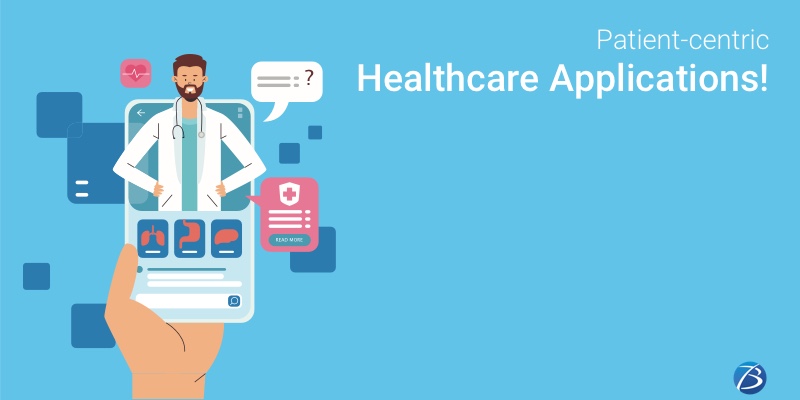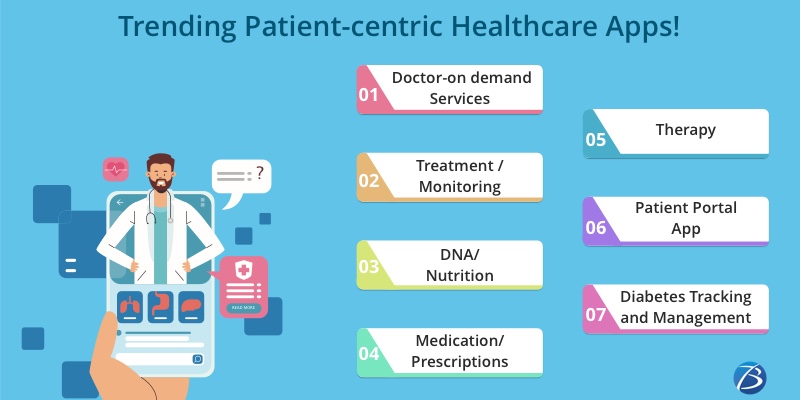Trending Patient-centric Healthcare Apps!


Innovative digital trends are giving rise to amazing healthcare applications that not only deliver a unique patient experience but also focus on patient satisfaction and meaningful patient engagement. These healthcare apps come with a promise of speedy access, less paperwork, enhanced convenience, secured payments, and improves productivity, healthcare records management, appointment management, etc., Such apps are beneficial to patients as well as service providers.
Let’s explore the offerings of some of the most trending patient-centric healthcare apps that every healthcare app creator must know!
Trending Patient-centric Healthcare Apps

Check out some of the most popular healthcare apps across various niches!
Doctor-on demand Services
Teladoc
This on-demand telehealth app provides instant virtual care in case of injuries and medical conditions that are not life-threatening. Using this app, individuals can avoid a doctor visit for minor ailments that can be easily resolved via video/telephonic communication. Once, users register themselves with the app and then furnish insurance particulars, they are informed about the services available to them as well as the charges involved. A basic charge of 75$ is levied for daily appointments in the case of users without an insurance policy.
Amwell
With Amwell, users get a convenient as well as an affordable option for resolving routine healthcare conditions that do not require an in-person visit. Amwell makes use of advanced technology to arrange for an online doctor visit through their mobile app or website and provides 24X7 services.
Once users log in, the app displays a list containing board-certified practitioners available within Amwell’s network. Then the users can discuss their health problem with the desired doctor using an on-the-spot video chat facility. These physicians answer queries, recommend treatment plans, and prescribe medication if required.
Apart from on-demand medical services users can also avail themselves of other healthcare services like nutrition advice, pediatric care, psychiatry, therapies, and many more. Though this app can be downloaded for free, charges apply for most of the services provided. But, if a patient’s health insurance covers Amwell services, the fees are either reduced or waived off completely.
Treatment /Monitoring
Eye Treatment: EyeCare Live
With this smartphone app, users can connect with eye specialists for consultation and advice; through advanced communication channels. This app is recommended for minor conditions like eye allergies, dryness or redness in eyes, any queries concerning contact lenses, etc. The users are asked to record their eye condition by clicking pictures or recording videos of their affected eye/s. Then, this picture/video is examined by a practitioner. High definition videos are used for this purpose so that the doctor gets a better understanding of the condition and is able to resolve the issue at the earliest.
The app connects users with a virtual eye doctor within an hour and allows users to renew prescriptions that are less than 2 years old. This app can be downloaded free of cost, but charges have to be paid for virtual doctor consultations and eye tests.
Customized Acne Treatment: MDacne
Earlier patients had to undergo long waiting times for obtaining a dermatologist’s appointment. But, with MDacne, users enjoy the facility of immediate access to dermatologists. The app comes with an outstanding UI and is easy to use.
The app provides a treatment plan as per the users’ skin type within five minutes of inquiry and works wonders in the realm of acne treatment. MDacne monitors skin conditions employing cutting-edge technologies provide productive recommendations, initiates a chat with dermatologists, and sends treatment reminders to patients. Besides, the app provides natural remedies for acne issues like skin redness or scarring, to patients who do not prefer chemical treatments.
The patients need to upload pictures of their affected area and answer certain questions regarding their skin. The app examines the skin within a few minutes and suggests treatment plans that can be tailored as per the patients’ specific needs and delivered to their doorstep.
Dermatology: First Derm
First Derm is a dermatology app designed to address external skin conditions. Users need to click two pictures of the affected area – one close view and another taken from a distance. These photos, along with a description of the issue provided by the users are sent to a licensed dermatologist who responds within twenty-four hours of receiving the snapshots and provides users a solution for their problem. The consultation charges for each case registered for doctor examination are 40$.
First Derm also offers an AI-powered service that helps users to identify a skin problem without consulting a dermatologist. The users need to upload a picture of their skin problem and then AI technology matches the image to all possible skin conditions
DNA/Nutrition
Generis
This is an avant-garde healthcare app that provides DNA-based advice, and recommendations concerning food, supplements, nutrition, fitness, etc. The app is capable of retrieving DNA-based data from 23 and ME and Ancestry.com. Its interface is pleasing as well as user-friendly. With this app, individuals are able to understand their genes and obtain actionable steps to follow that are secure and accurate as well. This way, users are educated to become the best version of themselves.
As the efficiency of burning energy differs from one individual to another, Generis employs a formula for rolling out the best-suited personalized suggestions for its users. This formula is prepared by genetics experts after considering over fifty markers that have positively impacted wellness. Furthermore, each claim made by Generis is backed by scientific evidence contained in peer-reviewed journals.
Medication/Prescriptions
Medication Reminder: Medisafe
With this app, users receive notifications on their smartphones regarding the intake of medicines. Medication reminders are so accurate that they notify patients of the exact time at which a particular medicine needs to be taken. Patients can manually add prescriptions and non-prescribed supplements like vitamins, or import prescriptions from renowned pharmacy chains like Rite Aid, CVS, Walgreens, etc.
Medisafe can also be utilized for tracking medication refills/measurements, receiving coupons on future prescriptions, and accessing resources as per their health condition.
Lowest Medication Prices: GoodRx
This app helps individuals to save expenses incurred on prescriptions. The GoodRx allows users to find the pharmacy that offers the lowest price for a particular medicine. The users need to search on the GoodRx app or website and are provided the option to select from over 75,000 pharmacies located in their area of residence. The price-tracker functionality allows consumers to observe prescription prices within their area and compare them with other pharmacies. The “coupon finder” feature automatically searches if there are any free coupons available for a specific prescription. Once, identified, users can activate the coupon using a button called “Get Coupon” and then avail of the benefits while collecting their prescription.
Therapy
Talkspace
This app offers to counsel regarding mental health problems such as depression, anxiety, addiction, eating disorders, LGBTQ, PTSD, etc. to individuals who do not have the resources or time to access in-person counseling. This digital therapy platform has roped on 2,000+ licensed psychiatrists and therapists offering private therapy services. The app matches and then connects users with their desired therapist via communication services like video/audio, unlimited text messaging, etc. Premium users can avail themselves of live online sessions as well. Users are recommended medication or treatment plans if needed.
Patient Portal App
MyChart
This patient portal app, allows individuals to avail of doctor communications, online appointment scheduling, and access their electronic health records. With this app, patients can have a look at their diagnostic test results, immunization history, prescribed medicines, and other healthcare records. These records are displayed on the screens of their computer/tablet/smartphone.
Patients can effortlessly schedule appointments as well as make payments for services using its features concerning bill payment and appointment scheduling. Moreover, users can utilize this app for connecting to their practitioners and sharing healthcare records from other doctors. Furthermore, with the usage of an activity tracking app, one can transfer their fitness/health data into his/her MyChart profile.
Diabetes Tracking and Management
Diabetes:M
This app assists diabetic patients in tracking/monitoring food intake and managing their glucose levels, insulin levels, injection sites, etc. Users can store their health data and receive detailed reports that can be then shared with doctors. The pro version allows users to create an additional profile and also connects users to their Bluetooth-empowered monitoring device.
MySugr
This app enables users to instantly track their blood glucose levels, bolus, carbs as well as estimated HbA1. Individuals need to log their healthcare data on a regular basis and this practice has helped them to manage diabetes in a better way. Moreover, physicians can review this data for treating their patients more effectively. Besides, MySugr provides motivating challenges to users coupled up with feedback on how to manage Type1/Type2 diabetes.
Concluding Lines:
Aren’t these game-changing apps amazing? If you too would like to architect such incredible patient-friendly healthcare apps, get in touch with Biz4Solutions, a prominent healthcare mobile app development company, having a rich experience of 10+ years in tailoring top-notch solutions for global clients. Check out our ready-to-use pharmacy delivery app as well.



